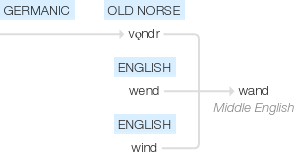Wand
Middle English: from Old Norse vǫndr, probably of Germanic origin and related to wend and wind2.
wiktionary
From Middle English wand, wond, from Old Norse vǫndr(“switch, twig”) [1], from Proto-Germanic *wanduz(“rod”), from Proto-Indo-European *wendʰ-(“to turn, twist, wind, braid”). Cognate with Icelandic vendi(“wand”), Danish vånd(“wand, switch”), German Wand(“wall, septum”), Gothic 𐍅𐌰𐌽𐌳𐌿𐍃( wandus, “rod”).
etymonline
wand (n.)
c. 1200, from Old Norse vondr "rod, switch" (cognate with Gothic wandus "rod," Middle Swedish vander), from Proto-Germanic *wend- "to turn," see wind (v.1)). The notion is of a bending, flexible stick. Compare cognate Old Norse veggr, Old English wag "wall," Old Saxon, Dutch wand, Old High German want, German Wand "wall," originally "wickerwork for making walls," or "wall made of wattle-work" (an insight into early Germanic domestic architecture). Magic wand is attested from c. 1400 and shows the etymological sense of "suppleness" already had been lost.
